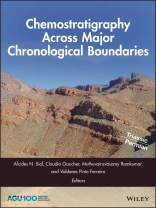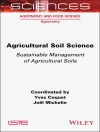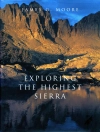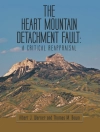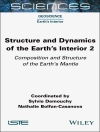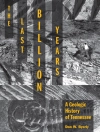Winner of the 2020 PROSE Award for Earth Science!
Exploring environmental changes through Earth’s geological history using chemostratigraphy
Chemostratigraphy is the study of the chemical characteristics of different rock layers. Decoding this geochemical record across chronostratigraphic boundaries can provide insights into geological history, past climates, and sedimentary processes. Chemostratigraphy Across Major Chronological Boundaries presents state-of-the-art applications of chemostratigraphic methods and demonstrates how chemical signatures can decipher past environmental conditions.
Volume highlights include:
* Presents a global perspective on chronostratigraphic boundaries
* Describes how different proxies can reveal distinct elemental and isotopic events in the geologic past
* Examines the Archaean-Paleoproterozoic, Proterozoic-Paleozoic, Paleozoic-Mesozoic, and Mesozoic-Paleogene boundaries
* Explores cause-and-effect through major, trace, PGE, and REE elemental, stable, and radiogenic isotopes
* Offers solutions to persistent chemostratigraphic problems on a micro-global scale
Geared toward academic and researchgeoscientists, particularly in the fields of sedimentary petrology, stratigraphy, isotope geology, geochemistry, petroleum geology, atmospheric science, oceanography, climate change and environmental science, Chemostratigraphy Across Major Chronological Boundaries offers invaluable insights into environmental evolution and climatic change.
Read the Editors’ Vox: https://eos.org/editors-vox/unravelling-the-past-using-elements-and-isotopes
Tabla de materias
Contributors vii
Preface xi
Acknowledgments xiii
Part I: Introduction
1. Chemostratigraphy as a Formal Stratigraphic Method 3
Alcides Nobrega Sial, Claudio Gaucher, Muthuvairavasamy Ramkumar, and Valderez Pinto Ferreira
2. Glossary of Chemostratigraphy 27
Muthuvairavasamy Ramkumar, Alcides Nobrega Sial, Claudio Gaucher, and Valderez Pinto Ferreira
Part II: Precambrian
3. The Archean-Proterozoic Boundary and the Great Oxidation Event 35
Claudio Gaucher and Robert Frei
4. Chronochemostratigraphy of Platform Sequences across the Paleoproterozoic-Mesoproterozoic Transition 47
Farid Chemale Junior and Felipe Guadagnin
5. Chemostratigraphy of the Mesoproterozoic-Neoproterozoic Transition 73
Juan Carlos Silva-Tamayo, Nova Giovanny, and Karol Tatiana Dussan-Tapias
6. The Cryogenian-Ediacaran Boundary in the Southern Amazon Craton 89
Afonso César Rodrigues Nogueira, Guilherme Raffaeli Romero, Evelyn Aparecida Mecenero Sanchez, Fábio Henrique Garcia Domingos, José Bandeira, Iara Maria dos Santos, Roberto Vizeu Lima Pinheiro, Joelson Lima Soares, Jean Michel Lafon, Jhon Willy Lopes Afonso, Hudson Pereira Santos, and Isaac Daniel Rudnitzki
7. The Ediacaran-Cambrian Transition: A Resource-Based Hypothesis for the Rise and Fall of the Ediacara Biota 115
Alan J. Kaufman
Part III: Paleozoic
8. delta¯13C Chemostratigraphy of the Ordovician-Silurian Boundary Interval 145
Stig M. Bergström and Daniel Goldman
9. Chemostratigraphy across the Permian-Triassic Boundary: The Effect of Sampling Strategies on Carbonate Carbon Isotope Stratigraphic Markers 159
Martin Schobben, Franziska Heuer, Melanie Tietje, Abbas Ghaderi, Dieter Korn, Christoph Korte, and Paul B. Wignall
Part IV: Mesozoic
10. Chemostratigraphy across the Triassic-Jurassic Boundary 185
Christoph Korte, Micha Ruhl, József Pálfy, Clemens Vinzenz Ullmann, and Stephen Peter Hesselbo
11. Jurassic-Cretaceous Carbon Isotope Geochemistry-Proxy for Paleoceanography and Tool for Stratigraphy 211
Helmut Weissert
12. Chemostratigraphy across the Cretaceous-Paleogene (K-Pg) Boundary: Testing the Impact and Volcanism Hypotheses 223
Alcides Nobrega Sial, Jiubin Chen, Luis Drude Lacerda, Robert Frei, John A. Higgins, Vinod Chandra Tewari, Claudio Gaucher, Valderez Pinto Ferreira, Simonetta Cirilli, Christoph Korte, José Antonio Barbosa, Natan Silva Pereira, and Danielle Santiago Ramos
Part V: Cenozoic
13. Cenozoic Chemostratigraphy: Understanding the Most Recent Era of the Earth’s History 261
Priyadarsi Debajyoti Roy, Muthuvairavasamy Ramkumar, and Ramasamy Nagarajan
Index 279
Sobre el autor
Alcides N. Sial, Federal University of Pernambuco, Brazil
Claudio Gaucher, University of the Republic, Uruguay
Muthuvairavasamy Ramkumar, Periyar University, India
Valderez Pinto Ferreira, Federal University of Pernambuco, Brazil
